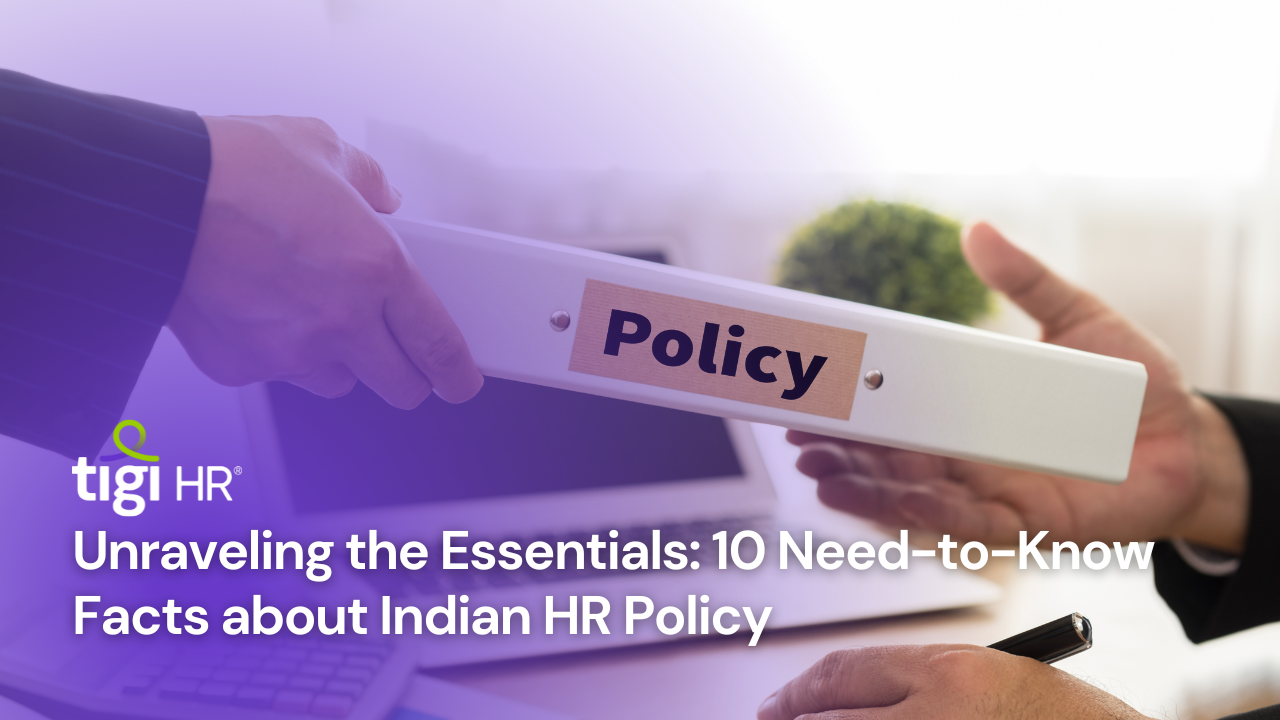India’s dynamic and diverse workforce forms the backbone of its rapidly growing economy. In this thriving business landscape, understanding the intricacies of Indian HR policy is essential for employers, HR professionals, and employees alike. From labour laws to employee benefits, this article delves into ten need-to-know facts about Indian HR policy, backed by real insights and statistics.
- Labour Laws and Regulations:
India boasts a comprehensive framework of labour laws that cover a wide array of employment aspects. Over 200 state and central laws govern minimum wages, working hours, leave entitlements, social security, and more. According to a report by the International Labour Organization (ILO), India’s labour laws span a wide range of sectors, including manufacturing, construction, and services, to ensure fair treatment and protection for workers.
- Female Workforce Participation:
Empowering women in the workforce has become a priority in India’s HR policy. The country’s female workforce participation rate stood at around 22% in 2019, according to data from the World Bank. To boost this number, the Indian government has introduced various initiatives like the Beti Bachao Beti Padhao scheme and increasing maternity leave benefits to promote gender equality.
- Maternity and Paternity Leave:
The Maternity Benefit Act, amended in 2017, extended maternity leave to 26 weeks. This move aligns with global standards and supports the health and well-being of both mother and child. Additionally, some progressive organizations have started offering paternity leave to foster a work-life balance for male employees, contributing to a more inclusive workplace.
- Sexual Harassment Prevention:
The Sexual Harassment of Women at Workplace (Prevention, Prohibition, and Redressal) Act mandates that organizations with ten or more employees establish Internal Complaints Committees (ICCs) to address sexual harassment complaints. A survey conducted by the Indian Bar Association revealed that around 72% of organizations in India have ICCs to ensure a safe and respectful working environment.
- Employee Provident Fund (EPF):
The Employee Provident Fund (EPF) is a significant social security benefit in India. Employers and employees both contribute 12% of the employee’s basic salary and dearness allowance to the EPF. According to official data from the Employees’ Provident Fund Organisation (EPFO), as of September 2021, there were over 225 million EPF accounts in the country.
- Gratuity:
Under the Payment of Gratuity Act, employees who have completed five years of continuous service are entitled to receive gratuity upon retirement, resignation, or death. The maximum amount of gratuity payable is ₹20 lakhs (approximately $27,000), according to the latest amendment.
- Employee State Insurance (ESI):
The Employee State Insurance (ESI) scheme provides medical and cash benefits to employees and their dependents in case of sickness, maternity, and injury. Data from the Employees’ State Insurance Corporation (ESIC) indicates that over 40 million employees are registered under the ESI scheme as of September 2021.
- Flexibility in Labour Laws:
In response to the COVID-19 pandemic, several Indian states introduced reforms to provide flexibility to employers in meeting certain labour law compliance requirements. These reforms aimed to attract investments and boost economic activity during challenging times.
- Contractual Employment:
Contractual employment has gained popularity in India, especially in sectors like IT, consulting, and gig economy platforms. Such arrangements offer flexibility to both employers and employees and have seen an upward trend in recent years.
- Skill Development Initiatives:
The Indian government has launched various skill development initiatives, such as the Skill India Mission and the National Apprenticeship Promotion Scheme (NAPS). These programs aim to enhance the employability of the workforce and bridge the skills gap in the job market.
Conclusion:
Indian HR policy is continually evolving to accommodate the changing needs of the workforce and employers. From promoting gender equality to ensuring social security benefits, the Indian HR landscape is marked by progressive measures. Staying informed about these need-to-know facts empowers businesses, HR professionals, and employees to navigate the regulatory framework effectively while fostering a positive and inclusive work environment. As India continues its journey towards economic growth, prioritizing the welfare and development of its workforce will remain a pivotal aspect of its HR policy.
Read more: We are hiring for Artificial Intelligence Engineer!





